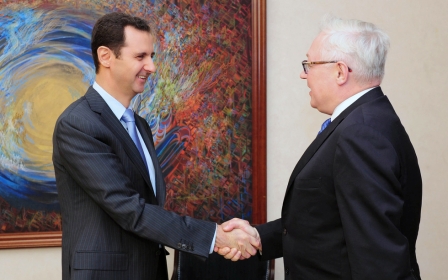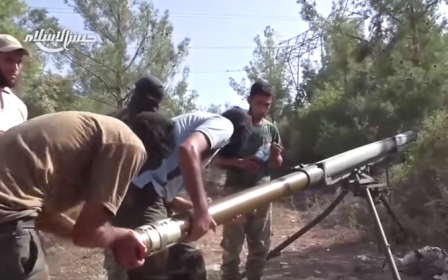Russia's moves in Middle East put US on back foot

As Russia flexes its military might in Europe and the Middle East, the US appears to be exercising prudence. But while some in Washington are downplaying these moves as Russian psychological posturing, others warn that Russia is now the main “existential threat” to the US.
“It’s a mix of fact and fiction that Russia is the only existential threat to the US today,” Patrick Skinner of the Soufan Group told Middle East Eye. Skinner is a former analyst at the Central Intelligence Agency.
He is referring to the latest heated rhetoric in some Washington circles with regards to Russia’s behaviour. Top military brass have been at odds with the US State Department’s diplomatic language on Russia, with the former insisting that US-Russia relations have reached a new low in the post-Cold War era.
“We just have to face the fact that Russia is coming back,” retired General Wesley Clark said in a CNN interview on Wednesday, echoing a general sentiment among the rank and file at the Pentagon. “Putin wants to rebuild the Soviet space … and send a warning to the rest of the world. This is a threat to the stability of the international order, and the system that we’ve taken for granted since the collapse of the Soviet Union.”
Missiles for Iran
Lately it is in the Middle East that Russia is flexing the most muscle, starting with Iran. Moscow has agreed to move forward on the sale of S-300 surface-to-air missiles (SAMs) to the Islamic Republic, a move considered controversial by the US and its allies. If received, the missiles will significantly boost Iran’s meek aerial capabilities, potentially putting it on par with its Arab rivals in the Gulf, or with Israel.
This particular military deal has long been something of a playing card in US-Russia relations. When the two superpowers have been in harmony, Russia has refrained from SAM talks with Iran. But as Cold War-style tensions rise, Moscow now is pushing to make the deal with the Islamic Republic.
Then there is Syria, a former Soviet ally. Earlier this month, Russia has expanded its port facilities and airfield there, both located along Syria’s Mediterranean coast. The Russian navy base in Tartous is Moscow’s only one outside the former Soviet bloc, and has long held a strategic and symbolic value to Moscow, which built the base in 1971.
Russia has also deployed fighter jets and ground military hardware including advanced tanks, Humvees and vehicles with high-frequency signal and jam-resistant equipment.
Russians on move in Syria
In the past month, civilians in Syria say they have been seeing Russian military vehicles driving on the highway from the coast to the capital, Damascus. Some told MEE that hundreds of unmarked trucks have also been spotted transporting unknown cargo to Damascus and the coastline.
The Russians have additionally deployed some 2,000 prefabricated houses, possibly to house Russian marines and personnel rumoured to be arriving at the coastal airfield, situated near Syrian President Bashar al-Assad’s ancestral village of Qurdaha.
Pentagon officials say they have now identified Russian drones and several manned flights in Syrian airspace, apparently familiarising themselves with the terrain. The US-led coalition against the Islamic State (IS) operates in the north and east of Syria, presenting an uncomfortable possibility of an encounter with Russian warplanes.
“Russia’s behaviour is an unprecedented direct military partnership with Assad, just like Iran and Hezbollah,” said Skinner. “It’s remarkable that in the fifth year of Syria’s war, Russia decided to pivot and do airstrikes in conjunction with Assad,” said Skinner.
A source familiar with Russia’s long military history in Syria have told MEE that there have always been off-limit Russian military installations in Syria.
“There are places where no Syrian military personnel are allowed to enter. Only Russian personnel,” said the source on condition of anonymity. “And in spite of Israel’s periodic sorties into Syrian airspace, none of these military assets have been activated, because the strategy is to not reveal what they have.”
'Join us or else'
If this further complicates the war in Syria, it brings US-Russia relations into an absurd but precarious dynamic unseen even during the Cold War.
“The Russians are saying: ‘Hey, US, join us or else.' But the US can’t join a fight alongside Iran and Hezbollah,” said Skinner. Iran and Hezbollah are staunch enemies of IS.
But with his latest manoeuvres in Syria, Putin has already scored points against Obama, forcing his hand on Assad. Putin has repeatedly said that ousting Assad is not an option, and now the Obama administration has begun to budge on this issue. After four years of insisting that the Syrian president has lost all legitimacy and must step down as a condition for peace, US officials now say Assad can be part of a political solution in the country.
Last week, Secretary of State John Kerry, speaking in London, said he would seek “common ground” on Syria, accepting that Assad could transition out of power over a short time period.
Critics of Obama say he has been absent on many foreign policy issues, and blame his inaction in Syria for the latest chest-pumping behaviour by Russia. With little over a year left in his term, Obama is unlikely to change course on Syria, or become confrontational with Putin, whom he considers to be a thug, according to White House insiders.
“Obama has no intention of increasing pressure on Russia. We’re not going to start a war over Ukraine. As for Syria, we might think it’s okay for Russia to take the lead, as long as we get what we want, and that’s eliminating IS,” said Skinner.
“But the next administration must face the question of what to do with Russia acting aggressively.” he said.
Stay informed with MEE's newsletters
Sign up to get the latest alerts, insights and analysis, starting with Turkey Unpacked
Middle East Eye delivers independent and unrivalled coverage and analysis of the Middle East, North Africa and beyond. To learn more about republishing this content and the associated fees, please fill out this form. More about MEE can be found here.




